Dear Zazie, Hey Z, guess whose birthday is today? The late, great Joe Cocker! So you know what that means; we have to play one of our favorite songs! Here is Cocker’s version of the Randy Newman song, from the official video from the movie 9 1/2 Weeks, our song, and the song of the day “You Can Leave Your Hat On”. We do not own the rights to this song or the video.
And here is today’s Lovers’ Chronicle from Mac Tag. Does the Dark Lady speak to you? Rhett
The Lover’s Chronicle
Dear Muse,
for you can this be written on this day
not necessarily, countin’ the means
for that has been done ad infinitum
but just of you and the inspiration
of told and untold beauty and sorrow
in many ways dashed across these pages
save this, perhaps the time presents itself
now that 60 winters have besieged us,
and dug deep furrows in our memories,
our youth’s proud missteps looked upon only;
the means for gettin’ from nowhere to here
we can look and tell the story seen there
now is the time the plot we develop
two livin’ as one and this carries on
© copyright 2021.2023 mac tag/cowboycoleridge all rights reserved
© copyright 2020 mac tag/cowboy coleridge all rights reserved
look in the rear view, tell me what you see
what was and could be, the discoveries
await, to give each other sweet release
© copyright 2019 mac tag/cowboy coleridge all rights reserved
in the rear view, that which was understood
bore not any sense of the true vision
the discoveries were still to be made
© copyright 2018 mac tag/cowboy coleridge all rights reserved
the world is far from here
we sit, watchin’
the last of twilight
and the oncomin’ dusk
the final light of day
leaves the sky,
through the gloamin’
come the first stars,
bright and wide apart
we watch the spaces
between them fill,
while near us the flames
and embers of the fire
grow brighter
some while after darkness
fully comes, we join
all has been as i had seen
in my thoughts beforehand…
the falls with the sun
settin’ on them,
the sinkin’ camp-fire,
the sound of the water,
the feelin’ of you
© copyright 2016 Mac tag all rights reserved
On this day in 1609 Shakespeare‘s sonnets were first published, most likely without his permission. The book contained 154 sonnets, all but two of which had never been published before. Shakespeare, or the publisher Thomas Thorpe, dedicated the collection to “Mr. W.H.” whose identity has never been known. The poems are about love, sex, politics, youth, and the mysterious “Dark Lady.” I feel honoured to know that the Dark Muse that speaks so well to me also visited Shakespeare. I suppose at one time or another she has inspired most poets. Hers is the only voice I hear now and I must hear a voice. So, let us now pay tribute to the Dark Muse with one of Shakespeare’s “Dark Lady” Sonnets:
CXXVII
In the old age black was not counted fair,
Or if it were, it bore not beauty’s name;
But now is black beauty’s successive heir,
And beauty slandered with a bastard shame:
For since each hand hath put on Nature’s power,
Fairing the foul with Art’s false borrowed face,
Sweet beauty hath no name, no holy bower,
But is profaned, if not lives in disgrace.
Therefore my mistress’ eyes are raven black,
Her eyes so suited, and they mourners seem
At such who, not born fair, no beauty lack,
Sland’ring creation with a false esteem:
Yet so they mourn becoming of their woe,
That every tongue says beauty should look so.
Select quotations of The Sonnets of William Shakespeare.
- I
From fairest creatures we desire increase,
That thereby beauty’s rose might never die
- II
When forty winters shall besiege thy brow,
And dig deep trenches in thy beauty’s field,
Thy youth’s proud livery so gazed on now,
Will be a tatter’d weed of small worth held
- III
Look in thy glass and tell the face thou viewest
Now is the time that face should form another
Die single and thine image dies with thee.
- IV
Unthrifty loveliness, why dost thou spend
Upon thy self thy beauty’s legacy?
Nature’s bequest gives nothing, but doth lend,
And being frank she lends to those are free
- V
Flowers distill’d, though they with winter meet,
Leese but their show; their substance still lives sweet.
- VI
Be not self-will’d, for thou art much too fair
To be death’s conquest and make worms thine heir.
- VII
Lo! in the orient when the gracious light
Lifts up his burning head, each under eye
Doth homage to his new-appearing sight,
Serving with looks his sacred majesty
- VIII
Music to hear, why hear’st thou music sadly?
Sweets with sweets war not, joy delights in joy
- IX
Beauty’s waste hath in the world an end,
And kept unused the user so destroys it.
- X
For shame! deny that thou bear’st love to any,
Who for thy self art so unprovident.
- XI
Let those whom nature hath not made for store,
Harsh, featureless, and rude, barrenly perish:
- XIV
Not from the stars do I my judgement pluck;
And yet methinks I have astronomy,
But not to tell of good or evil luck,
Of plagues, of dearths, or seasons’ quality…
- XV
When I consider every thing that grows
Holds in perfection but a little moment,
That this huge stage presenteth nought but shows
Whereon the stars in secret influence comment…
- XVI
To give away yourself, keeps yourself still,
And you must live, drawn by your own sweet skill.
- XVII
If I could write the beauty of your eyes,
And in fresh numbers number all your graces,
The age to come would say ‘This poet lies’
- XVIII
Shall I compare thee to a summer’s day?
Thou art more lovely and more temperate
- XIX
Devouring Time, blunt thou the lion’s paws,
And make the earth devour her own sweet brood;
Pluck the keen teeth from the fierce tiger’s jaws,
And burn the long-liv’d phoenix, in her blood
- Yet, do thy worst old Time: despite thy wrong,
My love shall in my verse ever live young.
- XXI
O! let me, true in love, but truly write,
And then believe me, my love is as fair
As any mother’s child, though not so bright
As those gold candles fix’d in heaven’s air…
- XXIII
O! learn to read what silent love hath writ:
To hear with eyes belongs to love’s fine wit.
- XXIX
For thy sweet love remember’d such wealth brings
That then I scorn to change my state with kings.
- XXX
But if the while I think on thee, dear friend,
All losses are restor’d and sorrows end.
- XXXI
Thy bosom is endeared with all hearts,
Which I by lacking have supposed dead;
And there reigns Love, and all Love’s loving parts,
And all those friends which I thought buried.
- Their images I lov’d, I view in thee,
And thou — all they — hast all the all of me.
- XXXII
- If thou survive my well-contented day,
When that churl Death my bones with dust shall cover,
And shalt by fortune once more re-survey
These poor rude lines of thy deceased lover,
Compare them with the bettering of the time,
And though they be outstripp’d by every pen,
Reserve them for my love, not for their rhyme,
Exceeded by the height of happier men.
- LVII
- Being your slave, what should I do but tend
Upon the hours and times of your desire?
I have no precious time at all to spend,
Nor services to do, till you require.
- LX
- Time doth transfix the flourish set on youth,
And delves the parallels in beauty’s brow,
Feeds on the rarities of nature’s truth,
And nothing stands but for his scythe to mow
- LXIV
This thought is as a death which cannot choose
But weep to have, that which it fears to lose.
- LXV
O! none, unless this miracle have might,
That in black ink my love may still shine bright.
- LXVI
Tired with all these, for restful death I cry
- LXXI
No longer mourn for me when I am dead
Then you shall hear the surly sullen bell
Give warning to the world that I am fled
From this vile world, with vilest worms to dwell:
Nay, if you read this line, remember not
The hand that writ it; for I love you so
That I in your sweet thoughts would be forgot
If thinking on me then should make you woe.
- LXXIII
That time of year thou mayst in me behold
When yellow leaves, or none, or few, do hang
Upon those boughs which shake against the cold,
Bare ruin’d choirs, where late the sweet birds sang.
- LXXXIII
I impair not beauty being mute,
When others would give life, and bring a tomb.
- There lives more life in one of your fair eyes
Than both your poets can in praise devise.
- LXXXIV
Who is it that says most, which can say more,
Than this rich praise, — that you alone, are you?
- LXXXVII
- Farewell! thou art too dear for my possessing
And like enough thou know’st thy estimate:
The charter of thy worth gives thee releasing;
My bonds in thee are all determinate.
- XCI
- And having thee, of all men’s pride I boast:
Wretched in this alone, that thou mayst take
All this away and me most wretched make.
- XCIV
- They that have power to hurt and will do none,
That do not do the thing they most do show,
Who, moving others, are themselves as stone,
Unmoved, cold, and to temptation slow:
They rightly do inherit heaven’s graces
- XCVII
- How like a winter hath my absence been
From thee, the pleasure of the fleeting year!
What freezings have I felt, what dark days seen!
What old December’s bareness everywhere!
- CI
Truth needs no colour, with his colour fixed;
Beauty no pencil, beauty’s truth to lay;
But best is best, if never intermixed?
- Because he needs no praise, wilt thou be dumb?
Excuse not silence so, for’t lies in thee
- CII
My love is strengthen’d, though more weak in seeming;
I love not less, though less the show appear;
That love is merchandiz’d, whose rich esteeming,
The owner’s tongue doth publish every where.
- CIV
To me, fair Friend, you never can be old,
For as you were when first your eye I eyed
Such seems your beauty still.
- CVI
For we, which now behold these present days,
Have eyes to wonder, but lack tongues to praise.
- CVII
Not mine own fears, nor the prophetic soul
Of the wide world dreaming on things to come,
Can yet the lease of my true love control,
Supposed as forfeit to a confin’d doom.
- CVIII
What’s in the brain, that ink may character,
Which hath not figur’d to thee my true spirit?
- CIX
For nothing this wide universe I call
Save thou, my Rose; in it thou art my all.
- CXV
Love is a babe, then might I not say so,
To give full growth to that which still doth grow?
- CXVI
If this be error and upon me prov’d,
I never writ, nor no man ever lov’d.
- CXXI
'Tis better to be vile than vile esteem'd, When not to be receives reproach of being; And the just pleasure lost, which is so deem'd Not by our feeling, but by others' seeing
- CXXVII
In the old age black was not counted fair,
Or if it were, it bore not beauty’s name
- CXXIX
The expense of spirit in a waste of shame
Is lust in action
- CXXX
- My mistress’ eyes are nothing like the sun;
Coral is far more red, than her lips red:
If snow be white, why then her breasts are dun;
If hairs be wires, black wires grow on her head. - I grant I never saw a goddess go, —
My mistress, when she walks, treads on the ground:
- CXXXII
Thine eyes I love, and they, as pitying me,
Knowing thy heart torment me with disdain,
Have put on black and loving mourners be,
Looking with pretty ruth upon my pain.
- CXXXIII
Beshrew that heart that makes my heart to groan
For that deep wound it gives my friend and me!
Is’t not enough to torture me alone,
But slave to slavery my sweet’st friend must be?
- CXXXV
Whoever hath her wish, thou hast thy ‘Will,’
And ‘Will’ to boot, and ‘Will’ in over-plus;
More than enough am I that vex’d thee still,
To thy sweet will making addition thus.
- CXXXVIII
When my love swears that she is made of truth,
I do believe her though I know she lies,
That she might think me some untutor’d youth,
Unlearned in the world’s false subtleties.
- CXLI
In faith I do not love thee with mine eyes,
For they in thee a thousand errors note;
But ’tis my heart that loves what they despise,
Who, in despite of view, is pleased to dote.
- CXLV
- ‘I hate’, from hate away she threw,
And sav’d my life, saying ‘not you’.
- CXLVI
- Poor soul, the centre of my sinful earth,
[Fool’d by] these rebel powers that thee array,
Why dost thou pine within and suffer dearth,
Painting thy outward walls so costly gay?
- CXLVII
Past cure I am, now Reason is past care,
And frantic-mad with evermore unrest;
My thoughts and my discourse as madmen’s are,
At random from the truth vainly express’d;
- For I have sworn thee fair, and thought thee bright,
Who art as black as hell, as dark as night.
- CXLVIII
O! how can Love’s eye be true,
That is so vexed with watching and with tears?
No marvel then, though I mistake my view;
The sun itself sees not, till heaven clears.
- CL
If thy unworthiness rais’d love in me,
More worthy I to be belov’d of thee.
- CLI
Love is too young to know what conscience is,
Yet who knows not conscience is born of love?
- CLII
For I have sworn thee fair; more perjur’d I,
To swear against the truth so foul a lie!
- CLIV
Love’s fire heats water, water cools not love.
<img src=”//en.wikiquote.org/wiki/Special:CentralAutoLogin/start?type=1×1″ alt=”” title=”” width=”1″ height=”1″ style=”border: none; position: absolute;” />
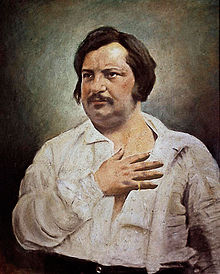 Today is the birthday of Honoré de Balzac (born Honoré Balzac, Tours 20 May 1799 – 18 August 1850 Paris); novelist and playwright. Perhaps best known for a sequence of short stories and novels collectively entitled La Comédie Humaine, which presents a panorama of French life in the years after the 1815 Fall of Napoleon Bonaparte. Balzac is regarded as one of the founders of realism in European literature. He is renowned for his multi-faceted characters. The city of Paris, a backdrop for much of his writing, takes on many human qualities. He wrote for 14 to 16 hours a day in a white dressing gown, and downed cup after cup of strong, black coffee. He considered himself “the secretary of French society,” and was so thorough that Oscar Wilde once said, “The 19th century, as we know it, is largely an invention of Balzac.” Many of Balzac’s works have been made into films, and they continue to inspire other writers. Balzac suffered from health problems throughout his life, possibly due to his intense writing schedule. In 1850, Balzac married Ewelina Hańska, a Polish aristocrat and his longtime love; he died in Paris five months later.
Today is the birthday of Honoré de Balzac (born Honoré Balzac, Tours 20 May 1799 – 18 August 1850 Paris); novelist and playwright. Perhaps best known for a sequence of short stories and novels collectively entitled La Comédie Humaine, which presents a panorama of French life in the years after the 1815 Fall of Napoleon Bonaparte. Balzac is regarded as one of the founders of realism in European literature. He is renowned for his multi-faceted characters. The city of Paris, a backdrop for much of his writing, takes on many human qualities. He wrote for 14 to 16 hours a day in a white dressing gown, and downed cup after cup of strong, black coffee. He considered himself “the secretary of French society,” and was so thorough that Oscar Wilde once said, “The 19th century, as we know it, is largely an invention of Balzac.” Many of Balzac’s works have been made into films, and they continue to inspire other writers. Balzac suffered from health problems throughout his life, possibly due to his intense writing schedule. In 1850, Balzac married Ewelina Hańska, a Polish aristocrat and his longtime love; he died in Paris five months later.
Penser, c’est voir! me dit-il un jour emporté par une de nos objections sur le principe de notre organisation. Toute science humaine repose sur la déduction, qui est une vision lente par laquelle on descend de la cause à l’effet, par laquelle on remonte de l’effet à la cause; ou, dans une plus large expression, toute poésie comme toute oeuvre d’art procède d’une rapide vision des choses.
Le véritable amour est éternel, infini, toujours semblable à lui-même; il est égal et pur, sans démonstrations violentes; il se voit en cheveux blancs, toujours jeune de cœur.
Mes avis sur vos relations avec les femmes sont aussi dans ce mot de chevalerie: Les servir toutes, n’en aimer qu’une.
Lorsque les femmes nous aiment, elles nous pardonnent tout, même nos crimes; lorsqu’elles ne nous aiment pas, elles ne nous pardonnent rien, pas même nos vertus!
Les femmes les plus vertueuses ont en elles quelque chose qui n’est jamais chaste.
L’amour est la plus mélodieuse de toutes les harmonies, et nous en avons le sentiment inné.La femme est un délicieux instrument de plaisir, mais il faut en connaitre les frémissantes cordes, en étudier la pose, le clavier timide, le doigté changeant et capricieux.
Le secret des grandes fortunes sans cause apparente est un crime oublié, parce qu’il a été proprement fait.
— Je suis tourmenté par de mauvaises idées.
— En quel genre? Ça se guérit, les idées.
– Comment?
– En y succombant.
- “I am tormented by temptations.”
“What kind? There is a cure for temptation.”
“What?”
“Yielding to it.”
Oh! voilà l’amour vrai, sans chicanes: il est ou n’est pas; mais quand il est, il doit se produire dans son immensité.
| Henri-Edmond Cross | |
|---|---|
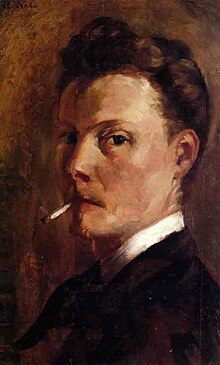
Self-Portrait with Cigarette, 1880
|
|
Today is the birthday of Henri-Edmond Cross (Henri-Edmond-Joseph Delacroix; Douai, Nord, France 20 May 1856 – 16 May 1910 Saint-Clair, Var, France); painter and printmaker. He is most acclaimed as a master of Neo-Impressionism and he played a role in shaping the second phase of that movement. He was an influence on Henri Matisse and many other artists. His work was instrumental in the development of Fauvism.
In 1909 Cross was treated in a Paris hospital for cancer. In January 1910 he returned to Saint-Clair, where he died of the cancer just four days short of his 54th birthday, on 16 May 1910. His tomb, in the Le Lavandou cemetery, features a bronze medallion that his friend Théo van Rysselberghe had designed. In July 1911, the city of Cross’s birth, Douai, mounted a retrospective exhibition of his work.



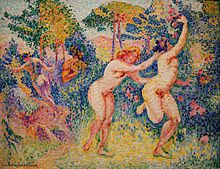


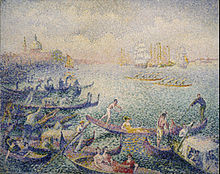
-

Sunset on the Lagoon, Venice 1898–1893
-
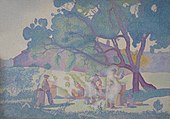
La Ferme, matin, 1893
-

Fisherman, 1895
-
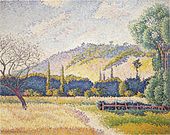
Landscape, c. 1896–1899
-

La barque bleue, 1899
-

La maison rose, c. 1901–1905
-
Ponte San Trovaso, 1902–1905
-

La Chaîne des Maures, 1906–1907
-

La baie à Cavalière, 1906–1907
-
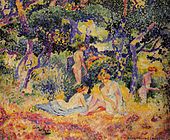
Le Bois, 1906–1907
-

Dormeuse nue dans la clairière, 1907
-

Hafenszene, by 1910
Mac Tag
Follow us on twitter @cowboycoleridge

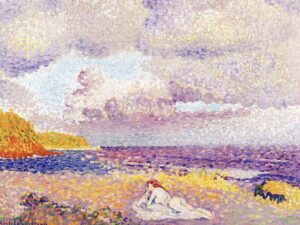
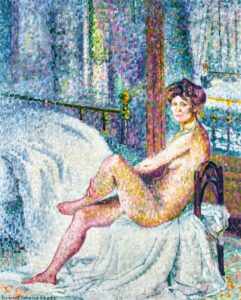
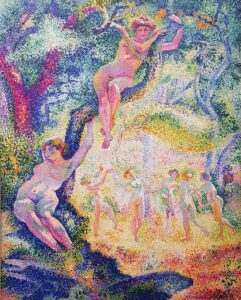


No Comments on "The Lovers’ Chronicle 20 May – discovery – Shakespeare’s Sonnets – birth of Honoré de Balzac – art by Henri-Edmond Cross"